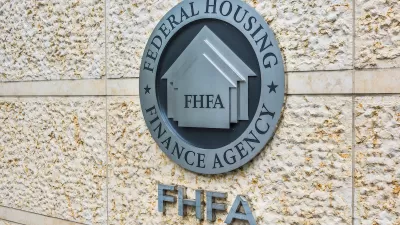It started with the popular desire to dissolve what some consider to be the cause of the 2008 melt-down - Freddie Mac and Fannie Mae, and has spread to rethinking the tax write-off of home ownership - a clearly unpopular notion for many.
The administration published a report on Feb. 11 that analyzed the option of dissolving Fannie and Freddie and how to replace their function. The report noted doing such would most certainly "raise the cost of mortgage loans and push homeownership beyond the reach of some families." The administration doesn't appear to be deterred by that possibility though.
"...administration officials said they had concluded the country could no longer afford to sustain its commitment to minting homeowners. Better to help some people rent."
The government "must help to ensure that all Americans have access to quality housing that they can afford," the report said. "This does not mean our goal is for all Americans to be homeowners."
From History News Network: Origins of Freddie Mac and Fannie Mae?: "Fannie Mae was created in 1938 as part of Franklin Delano Roosevelt's New Deal. The collapse of the national housing market in the wake of the Great Depression discouraged private lenders from investing in home loans. Fannie Mae was established in order to provide local banks with federal money to finance home mortgages in an attempt to raise levels of home ownership and the availability of affordable housing...."
FULL STORY: Administration Calls for Cutting Aid to Home Buyers

Planetizen Federal Action Tracker
A weekly monitor of how Trump’s orders and actions are impacting planners and planning in America.

Restaurant Patios Were a Pandemic Win — Why Were They so Hard to Keep?
Social distancing requirements and changes in travel patterns prompted cities to pilot new uses for street and sidewalk space. Then it got complicated.

Maui's Vacation Rental Debate Turns Ugly
Verbal attacks, misinformation campaigns and fistfights plague a high-stakes debate to convert thousands of vacation rentals into long-term housing.

In California Battle of Housing vs. Environment, Housing Just Won
A new state law significantly limits the power of CEQA, an environmental review law that served as a powerful tool for blocking new development.

Boulder Eliminates Parking Minimums Citywide
Officials estimate the cost of building a single underground parking space at up to $100,000.

Orange County, Florida Adopts Largest US “Sprawl Repair” Code
The ‘Orange Code’ seeks to rectify decades of sprawl-inducing, car-oriented development.
Urban Design for Planners 1: Software Tools
This six-course series explores essential urban design concepts using open source software and equips planners with the tools they need to participate fully in the urban design process.
Planning for Universal Design
Learn the tools for implementing Universal Design in planning regulations.
Heyer Gruel & Associates PA
JM Goldson LLC
Custer County Colorado
City of Camden Redevelopment Agency
City of Astoria
Transportation Research & Education Center (TREC) at Portland State University
Camden Redevelopment Agency
City of Claremont
Municipality of Princeton (NJ)





























